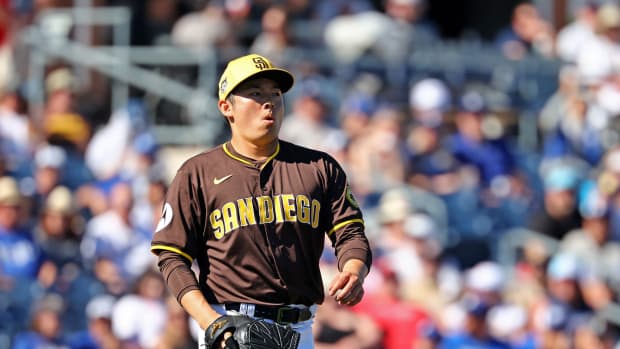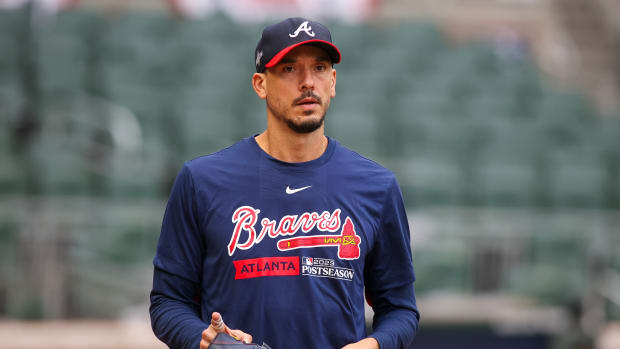
Darvish's near perfect game latest example of pitching dominance

Yu Darvish lost a perfect game with one out to go, finishing with 14 strikeouts against the Astros.
/AP
One day early last season I handed Yu Darvish a baseball and asked him to show me the grips for his different pitches. By the time he reached his ninth different grip, my head was spinning. Armed with pen and notebook, I literally could not keep up with him.
I thought about that moment as Darvish looked toward the signals of Texas catcher A.J. Pierzynski last night to throw a seventh-inning pitch to the Astros' Brett Wallace. Darvish shook once, twice, three times and then a fourth time before finally nodding in agreement to Pierzynski's suggestion, like a patron at a Greek diner finally pointing a finger at an entrée among pages and pages of dining options. What resulted was a 97-mph fastball, the plain old BLT of pitches.
Darvish 2.0, embarking on his second season in the big leagues after a dominating career in Japan, was never better or more diverse in his efficiency than he was in Tuesday night's 7-0 win against Houston. He pitched like a magician -- all feint of hand and master of illusion -- right to the brink of immortality. Twenty-six up, 26 down. Then somebody named Marwin Gonzalez put a stop to the magic show.
With two outs in the ninth, Gonzalez grounded a single right through the legs of Darvish and into centerfield. Instead of the 24th perfect game in baseball history, Darvish had something more than twice as rare: the pain of losing a perfect game with one more out to go.
Only 10 previous times had the 27th batter broken up a perfecto, the last time before Tuesday night coming infamously on June 2, 2010, when umpire Jim Joyce blew a call at first base that would have completed a perfect game for Armando Galarraga of Detroit.
If it seems as if we are on watch for no-hitters and perfect games on an almost weekly basis, well, we are -- and don't expect it to stop. Darvish came within one out of the fourth perfect game inside a calendar year, following Phillip Humber, Matt Cain and Felix Hernandez last year. (There were four perfect games from 1900-1963.) There were 15 no-hitters thrown in the past three seasons, including seven last year.
This is not a fluke. This era of great pitching has been in force for at least three seasons. Hits per game have declined six straight years and strikeouts, as I explained in the Sports Illustrated baseball preview edition, are more common than ever before in the game's history, especially after what passed for a statistical Beamonesque leap last year. Darvish struck out 14 Astros on Tuesday night, which would have tied the record in a perfect game, shared by Cain and Sandy Koufax.
The way Darvish throws is a proxy for why the game belongs to pitchers in this era. He represents all the ingredients that explain what is going on: the increase in velocity in the game (he hit 97 mph); a Whitman's sampler of breaking balls (there were times Tuesday night when his pitches moved so much and so strangely it looked as if the ball was no longer round); and he is young, just 26 years old.
Humber was 29 when he threw his perfecto. Cain was 27. Hernandez was 25. After the first three days of the season, no starting pitcher older than 30 has won a game.
This is not crazy. This is baseball the way it is played today. Hits keep declining. The ball is put in play less often than ever before. (One out of every five plate appearances ends in a strikeout.) And when the ball is put in play, the defense is better than ever, in part because detailed analytics put defenders in the best possible spot to deprive a hit. Pitchers are throwing with more velocity and making the ball move in more ways than ever before.
The surprise was not that Darvish came within one out of a perfect game. The surprise was that he didn't get it. Rest assured, we won't have to wait long for another.


































